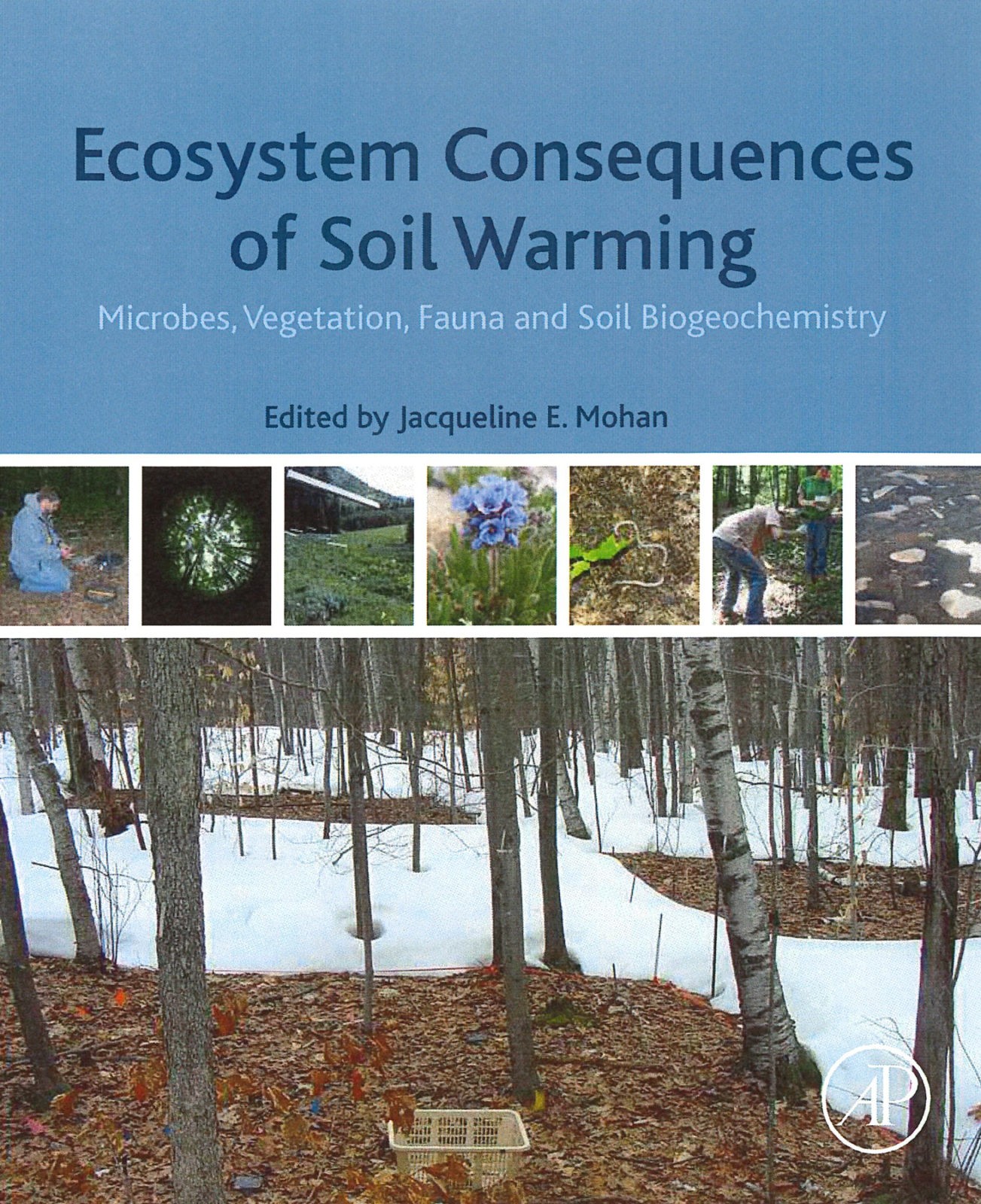April 29, 2019
Athens, Ga. – As global temperatures rise, it is not only the air and water growing warmer: soils are affected too. A new textbook, edited by University of Georgia ecologist Jacqueline Mohan and featuring contributions from more than seventy experts, provides a comprehensive look at how plants, animals, microbes and their physical environment respond to warming soils.
“My goal with this book was to help figure out the implications of soil warming for earth’s biodiversity, and how earth’s biodiversity and ecosystems might in turn influence the climate,” Mohan said.
Mohan, who has conducted soil warming experiments at Harvard Forest in Massachusetts, Duke Forest in North Carolina and Whitehall Forest in Georgia, studies the impacts of global change on forests and plant and soil feedbacks to the climate system. Her research explores how rising temperatures and carbon dioxide levels affect forest composition and succession, as well as biogeochemistry—the chemical linkages among living organisms, soils and the atmosphere.
“Ecosystem Consequences of Soil Warming: Microbes, Vegetation, Fauna and Soil Biogeochemistry” explores the worldwide implications of warming soils from a variety of scientific perspectives, integrating insights from the fields of ecology, soil science, genetics and molecular, evolutionary and conservation biology.
“There’s a whole chapter on the geochemical physical mineral properties of the soil and how that may affect the soil atmosphere carbon balance,” Mohan said. “We also have a chapter on plant eco-evolutionary dynamics in response to warmer soil conditions, and a chapter on soil fauna. I wanted to cross kingdoms of life, all of biogeochemistry and almost all the planet.”
To ensure such a comprehensive perspective, Mohan invited researchers working in ecosystems around the world to contribute to the book.
“I’m very happy that we have chapters from world experts on climate change in Arctic systems and Antarctic systems, tropical systems and temperate systems, alpine systems, grasslands and forests,” she said. “My hope was that we could literally span the globe geographically, and we were able to do that.”
“Ecosystem Consequences of Soil Warming” is intended as a textbook for teachers and students and a reference book for scientists. It should also be useful for managers and conservationists.
“A recurring theme is that many of these systems that are so important from a biodiversity perspective are so understudied in terms of a climate change perspective,” Mohan said. “This book can be a reference for studying a particular ecosystem, including its plant communities, its animals and its soils and microbes, and asking how might we expect these systems to change as soils warm with climate change.”
“Ecosystem Consequences of Soil Warming: Microbes, Vegetation, Fauna and Soil Biogeochemistry” was published by Academic Press, an imprint of Elsevier, on April 26, 2019.
Besides Mohan, contributing authors include University of Georgia ecology alumni Peter M. Groffman, PhD ’84, Shafkat Khan, PhD ’16, Megan Machmuller, PhD ’14, and Bruce A. Snyder, PhD ’08; current faculty members Jill Anderson and Mac Callaham, current staff member Paul Frankson, former faculty members Mark A. Bradford and Richard P. Shefferson, and former postdoctoral associates Charles Cowden and Susana M. Wadgymar. Other authors are Rebecca Abney, Walter S. Andriuzzi, Morgan Elizabeth Barnes, Katherine Benavides, Asmeret Asefaw Berhe, Jeffrey L. Blanchard, Nathaniel Alexander Bogie, John L. Campbell, Joanna Carey, Alyssa Carrell, Molly A. Cavaleri, F Stuart Chapin III, Priyanka Roy Chowdhury, Thomas Crowther, Kristen M. DeAngelis, Serita Frey, Teamrat A. Ghezzehei, Christian Giardina, Robert Hanifin, John Harte, Meredith D. Jabis, Lifen Jiang, Lixia Jin, Stephanie N. Kivlin, Lara M. Kueppers, Kaitlin C. Lubetkin, Sarah Ludwig, Yiqi Luo, Rachel M. MacTavish, Jerry M. Melillo, John C. Moore, Kimber Candice Moreland, Susan M. Natali, rew Nottingham, Grace Pold, Yamina Pressler, Sasha C. Reed, Adriana L. Romero-Olivares, Jennifer A. Rudgers, Lindsey E. Rustad, Verity Salmon, Rebecca Sanders-DeMott, Fernanda Santos, Edward A. G. Schuur, Junjiong Shao, Zheng Shi, Rodney Simpson, Martijn Slot, Benjamin N. Sulman, Vidya Suseela, Jim Tang, Pamela H. Templer, Katherine Todd-Brown, Natasja C. van Gestel, Diana H. Wall, Daniel E. Winkler, Tana E. Wood, Yan Yang, Xuhui Zhou and Zhenghu Zhou.
In the book’s acknowledgements, Mohan thanked Dr. M. Steiner and the JDRF (Juvenile Diabetes Research Foundation). “Dr. Steiner literally saved my life when I was diagnosed with Type 1 diabetes at 21 months,” she said. “I’d like to acknowledge him and the JDRF as a call-out to others with ‘invisible disabilities.’”

